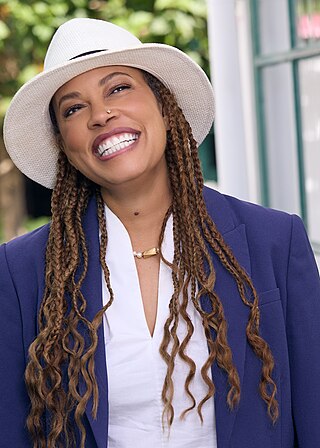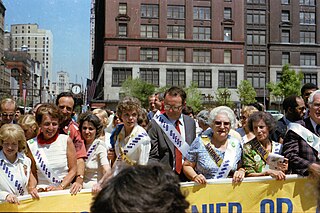Related Research Articles
Radical feminism is a perspective within feminism that calls for a radical re-ordering of society in which male supremacy is eliminated in all social and economic contexts, while recognizing that women's experiences are also affected by other social divisions such as in race, class, and sexual orientation. The ideology and movement emerged in the 1960s.
Women's studies is an academic field that draws on feminist and interdisciplinary methods to place women's lives and experiences at the center of study, while examining social and cultural constructs of gender; systems of privilege and oppression; and the relationships between power and gender as they intersect with other identities and social locations such as race, sexual orientation, socio-economic class, and disability.
Feminist theory is the extension of feminism into theoretical, fictional, or philosophical discourse. It aims to understand the nature of gender inequality. It examines women's and men's social roles, experiences, interests, chores, and feminist politics in a variety of fields, such as anthropology and sociology, communication, media studies, psychoanalysis, political theory, home economics, literature, education, and philosophy.
Sandra G. Harding is an American philosopher of feminist and postcolonial theory, epistemology, research methodology, and philosophy of science. She directed the UCLA Center for the Study of Women from 1996 to 2000, and co-edited Signs: Journal of Women in Culture and Society from 2000 to 2005. She is currently a Distinguished Professor Emeritus of Education and Gender Studies at UCLA and a Distinguished Affiliate Professor of Philosophy at Michigan State University. In 2013 she was awarded the John Desmond Bernal Prize by the Society for the Social Studies of Science (4S).

Feminist sociology is an interdisciplinary exploration of gender and power throughout society. Here, it uses conflict theory and theoretical perspectives to observe gender in its relation to power, both at the level of face-to-face interaction and reflexivity within social structures at large. Focuses include sexual orientation, race, economic status, and nationality.

Intersectionality is a sociological analytical framework for understanding how groups' and individuals' social and political identities result in unique combinations of discrimination and privilege. Examples of these factors include gender, caste, sex, race, ethnicity, class, sexuality, religion, disability, height, age, weight and physical appearance. These intersecting and overlapping social identities may be both empowering and oppressing. However, little good-quality quantitative research has been done to support or undermine the practical uses of intersectionality.

Patricia Hill Collins is an American academic specializing in race, class, and gender. She is a distinguished university professor of sociology emerita at the University of Maryland, College Park. She is also the former head of the Department of African-American Studies at the University of Cincinnati. Collins was elected president of the American Sociological Association (ASA), and served in 2009 as the 100th president of the association – the first African-American woman to hold this position.
Standpoint theory, or standpoint epistemology, is a theory for analyzing intersubjective discourses. Standpoint theory proposes that authority is rooted in individuals' personal knowledge and perspectives and the power that such authority exerts.
Television studies is an academic discipline that deals with critical approaches to television. Usually, it is distinguished from mass communication research, which tends to approach the topic from a social sciences perspective. Defining the field is problematic; some institutions and syllabuses do not distinguish it from media studies or classify it as a subfield of popular culture studies.

Sociology of gender is a prominent subfield of sociology. Social interaction directly correlated with sociology regarding social structure. One of the most important social structures is status. This is determined based on position that an individual possesses which effects how they will be treated by society. One of the most important statuses an individual claims is gender. Public discourse and the academic literature generally use the term gender for the perceived or projected (self-identified) masculinity or femininity of a person.
Michael Alan Messner is an American sociologist. His main areas of research are gender and the sociology of sports. He is the author of several books, he gives public speeches and teaches on issues of gender-based violence, the lives of men and boys, and gender and sports.

France Winddance Twine is a Black and Native American sociologist, ethnographer, visual artist, and documentary filmmaker. Twine has conducted field research in Brazil, the UK, and the United States on race, racism, and anti-racism. She has published 11 books and more than 100 articles, review essays, and books on these topics.
Beverley Skeggs is a British sociologist, noted as one of the foremost feminist sociologists in the world. Currently, she works as a "Distinguished Professor" in the Sociology Department at Lancaster University, developing a Center for Social Inequalities in the North West of England. She continues to run the "Economics of Care" theme at the International Inequalities centre at the London School of Economics (LSE) and is a visiting professor at Goldsmiths University. She has been the head of two of the UK's leading Sociology Departments, at the University of Manchester and Goldsmiths, as well as co-director of Lancaster's Women's Studies. In addition, she played a part in transforming Britain's oldest sociology journal, The Sociological Review, into an independent foundation devoted to opening up critical social science and supporting social scientists.

The personal is political, also termed The private is political, is a political argument used as a rallying slogan of student movement and second-wave feminism from the late 1960s. In the context of the feminist movement of the 1960s and 1970s, it was a challenge to the nuclear family and family values. The phrase was popularized by the publication of a 1969 essay by feminist activist Carol Hanisch under the title "The Personal Is Political" in 1970, and has been repeatedly described as a defining characterization of second-wave feminism, radical feminism, women's studies, or feminism in general. It has also been used by some women artists as the underlying philosophy for their art practice.
Cultural studies is a politically engaged postdisciplinary academic field that explores the dynamics of especially contemporary culture and its social and historical foundations. Cultural studies researchers generally investigate how cultural practices relate to wider systems of power associated with, or operating through, social phenomena. These include ideology, class structures, national formations, ethnicity, sexual orientation, gender, and generation. Employing cultural analysis, cultural studies views cultures not as fixed, bounded, stable, and discrete entities, but rather as constantly interacting and changing sets of practices and processes. The field of cultural studies encompasses a range of theoretical and methodological perspectives and practices. Although distinct from the discipline of cultural anthropology and the interdisciplinary field of ethnic studies, cultural studies draws upon and has contributed to each of these fields.

Ecofeminism is a branch of feminism and political ecology. Ecofeminist thinkers draw on the concept of gender to analyse the relationships between humans and the natural world. The term was coined by the French writer Françoise d'Eaubonne in her book Le Féminisme ou la Mort (1974). Ecofeminist theory asserts a feminist perspective of Green politics that calls for an egalitarian, collaborative society in which there is no one dominant group. Today, there are several branches of ecofeminism, with varying approaches and analyses, including liberal ecofeminism, spiritual/cultural ecofeminism, and social/socialist ecofeminism. Interpretations of ecofeminism and how it might be applied to social thought include ecofeminist art, social justice and political philosophy, religion, contemporary feminism, and poetry.
Chela Sandoval, associate professor of Chicana Studies at University of California, Santa Barbara, is a noted theorist of postcolonial feminism and third world feminism. Beginning with her 1991 pioneering essay 'U.S. Third World Feminism: The Theory and Method of Oppositional Consciousness in the Postmodern World', Sandoval emerged as a significant voice for women of color and decolonial feminism.

The socio-political movements and ideologies of feminism have found expression in various media. These media include newspaper, literature, radio, television, social media, film, and video games. They have been essential to the success of many feminist movements.

Feminist rhetoric emphasizes the narratives of all demographics, including women and other marginalized groups, into the consideration or practice of rhetoric. Feminist rhetoric does not focus exclusively on the rhetoric of women or feminists, but instead prioritizes the feminist principles of inclusivity, community, and equality over the classic, patriarchal model of persuasion that ultimately separates people from their own experience. Seen as the act of producing or the study of feminist discourses, feminist rhetoric emphasizes and supports the lived experiences and histories of all human beings in all manner of experiences. It also redefines traditional delivery sites to include non-traditional locations such as demonstrations, letter writing, and digital processes, and alternative practices such as rhetorical listening and productive silence. According to author and rhetorical feminist Cheryl Glenn in her book Rhetorical Feminism and This Thing Called Hope (2018), "rhetorical feminism is a set of tactics that multiplies rhetorical opportunities in terms of who counts as a rhetor, who can inhabit an audience, and what those audiences can do." Rhetorical feminism is a strategy that counters traditional forms of rhetoric, favoring dialogue over monologue and seeking to redefine the way audiences view rhetorical appeals.
Mizrahi feminism is a movement within Israeli feminism, which seeks to extricate Mizrahi women from the binary categories of Mizrahi-Ashkenazi and men-women. Mizrahi feminism is inspired by both Black feminism and Intersectional feminism, and seeks to bring about the liberation of women and social equality through recognition of the particular place Mizrahi women hold on the social map, and all the ways it affects Mizrahi women.
References
- ↑ The Communication Review since 1999. Press has been a fellow at the Oxford Center
- ↑ Kaplan, Ann E. 1994. Untitled Book Reviews. Signs. Vol. 19, No. 2, pp. 550-555.
- ↑ Appendix A, pp.143-156.
- ↑ Eliasoph, Nina (2000). "Review of Speaking of Abortion: Television and Authority in the Lives of Women". American Journal of Sociology. 106 (1): 232–234. doi:10.1086/303120.